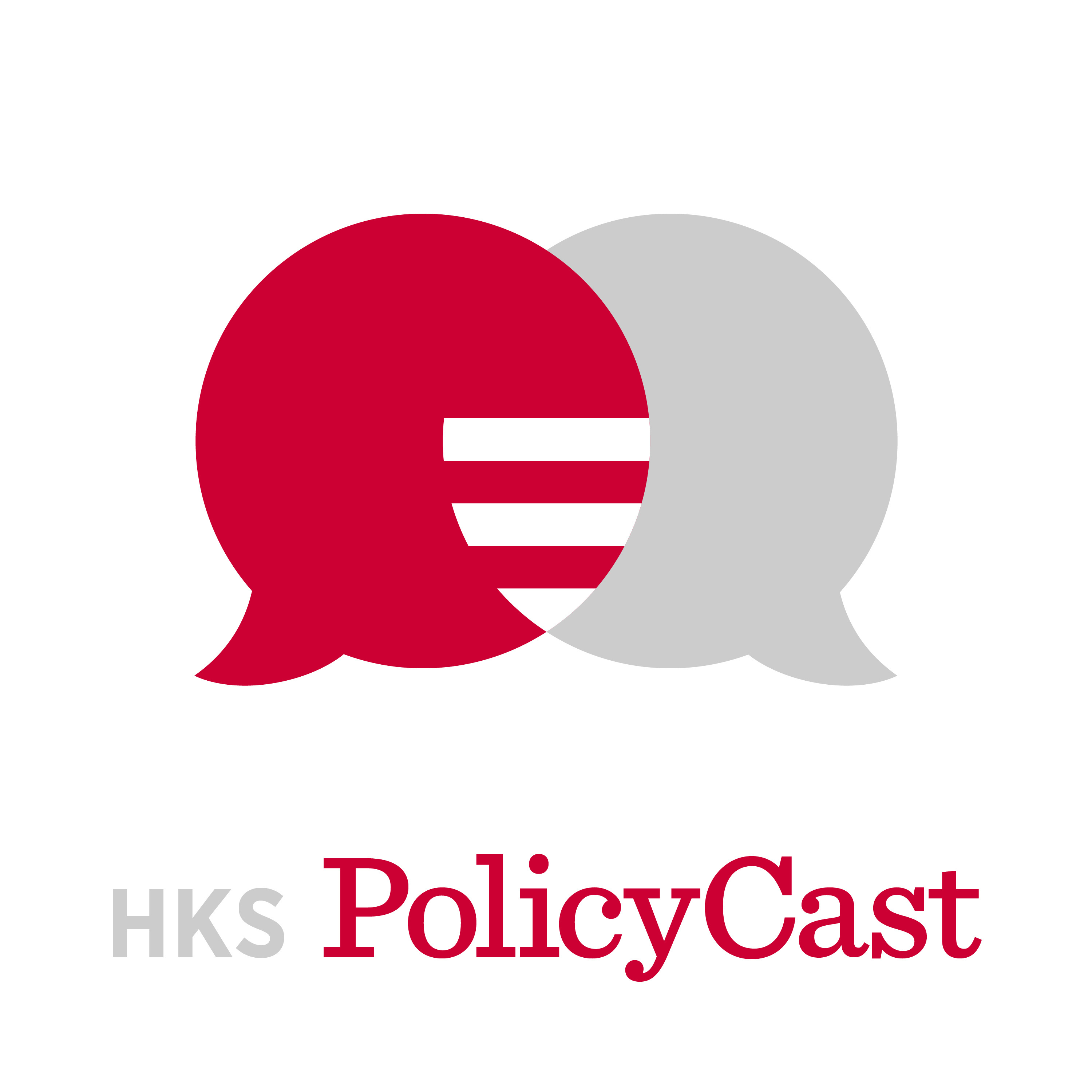

PolicyCast
Harvard Kennedy School
PolicyCast explores research-based policy solutions to the big problems and issues we're facing in our society and our world. Host Ralph Ranalli talks with leading Harvard University academics and researchers, visiting scholars, dignitaries, and world leaders. PolicyCast is produced at the Kennedy School of Government at Harvard University.
Episodes
Mentioned books

Nov 11, 2015 • 24min
The Smartest Time on TV
Bob Schieffer, former host of CBS News’s Face the Nation and current Walter Shorenstein Media and Democracy Fellow at the Shorenstein Center, explains the enduring popularity of the Sunday morning political talk show, offers his take on what he calls “the most different” presidential campaign in his long memory, and recounts some of his favorite stories from the campaign trail.

Nov 4, 2015 • 28min
The Development of Agency
HKS Adjunct Lecturer Ronald Ferguson emphasizes the importance of looking beyond standardized test results and measuring students’ sense of agency - the belief that they have the capacity to succeed - in order to address lingering achievement gaps.

Oct 28, 2015 • 26min
The Power of Protests, Propaganda and Religion
HKS Associate Professor David Yanagizawa-Drott’s quantitative analysis of three seemingly disparate topics shows the power of protests to change policy, the power of propaganda to induce violence and the power of religion to create happiness despite reducing GDP.
You can read more on Professor Yanagizawa-Drott’s research on the HKS Faculty Research Connection website: https://research.hks.harvard.edu/publications/faculty_name.aspx?PersonId=256

Oct 21, 2015 • 21min
From Selma to Harvard: Supporting the notion of public service
Harvard President Drew Gilpin Faust discusses what drew her to the study of history; her role as a student activist in the civil rights movement in Selma; how her experience as an activist shapes her leadership now; her advice to young people who are trying to balance public service and career goals; and how universities can help students make those choices.

Oct 14, 2015 • 22min
How the UN set the standard for human rights in the corporate world
HKS Professor John Ruggie, who has twice served in senior roles at the United Nations, describes how the UN was able to leverage its convening power to create an unprecedented set of "Guiding Principles" for corporate responsibility on human rights issues. He also speaks to the growing role international sporting organizations like FIFA and the Olympics will need to play in bolstering human rights.

Oct 7, 2015 • 23min
Don't Panic: China's Just Switching Gears
Peiran Wei, a 2015 China and Globalization Fellow at the Ash Center for Democratic Governance and former Bloomberg reporter, describes his country as "switching gears" – in its economy, its politics, and its culture. Wei discusses attitudes towards the rising billionaire class in China, the impact of China’s capital outflow around the globe, and the importance of social stability to the Communist Party.

Sep 30, 2015 • 21min
Why Hasn't Homeownership Recovered?
Christopher Herbert, managing director of Harvard’s Joint Center for Housing Studies, explains whether there’s reason for concern about the state of the US housing market, which has been beset by falling homeownership rates, rising rents, stalling incomes and demographic shifts that threaten to exacerbate trends towards inequality.
If you’d like to learn more, you can read the 2015 State of the Nation’s Housing Report at the Harvard Joint Center for Housing Studies website.

Sep 23, 2015 • 25min
How to Fix a Sovereign Debt Crisis
HKS Professor Carmen Reinhart details the lessons we can learn from two centuries of data on how countries have historically dealt with debt problems. She discusses the long menu of debt relief options that are often overlooked, criticizes the disparity between how debt problems are addressed in emerging markets and advanced economies, and applies her findings to the situations in Greece and Puerto Rico.

Sep 16, 2015 • 27min
America: The Next Great Emerging Market?
Retired US Army Gen. David Petraeus, a non-resident senior fellow at the Belfer Center, explains why he believes a combination of four technological revolutions will lead to a renewed era of American power. Not just for the United States, but for Canada and Mexico, too. He details the steps he believes the United States must take to take advantage of its position at the head of each technological advancement.
Gen. Petraeus also offers his perspective on the aftermath of the Iran nuclear deal, whether the United States can work with Iran regarding ISIS and the Syrian civil war, why the US should be wary of Iran’s increasingly cozy relationship with Russia, and how US strategy needs to adapt in the fight against ISIS.
You can read the general’s report, co-authored with Paras D. Bhayani, titled “The Next Great Emerging Market? Capitalizing on North America’s Four Interlocking Revolutions” on the Belfer Center’s website: http://belfercenter.ksg.harvard.edu/files/The%20Next%20Great%20Emerging%20Market%20FINAL.pdf
Hear the interview mentioned in the show’s intro featuring Prof. Joseph Nye: https://soundcloud.com/harvard/joe-nye-on-presidential?in=harvard/sets/policycast

Sep 9, 2015 • 23min
The Iran Nuclear Accord: What Happens Next?
Gary Samore, President Obama’s former principal advisor on arms control and nuclear proliferation who currently serves as the Director for Research at the Belfer Center, gives his take on the agreement struck between Iran and a group of world powers referred to as the P5+1 to restrict and monitor Iran’s nuclear research and development program. He explains why he supports the pact, what concessions he’s most worried about, why he doesn’t believe Iran will be able to cheat, why Iran’s enhanced economic power won’t destabilize the region, and why United States allies such as Israel and Saudi Arabia should have less reason to worry.
You can read more about the nuclear agreement in “The Iran Nuclear Deal: A Definitive Guide [PDF],” published by the Belfer Center and edited by Dr. Samore.


